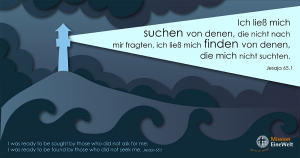Andacht – Auf Sicht fahren
Müsste ich entscheiden, was der Spruch des Jahres 2020 werden soll, würde ich wohl diesen nehmen: „Auf Sicht fahren“. Er sagt so deutlich, in was für einer Situation wir uns derzeit befinden: Wir können nicht langfristig planen. Zumindest bei Besuchen, Urlaubsfahrten und Aus(lands)reisen setzen wir ja mittlerweile hinzu: „Wenn’s denn möglich sein wird“. Das war vor einem Jahr nicht der Fall. Damals – erinnern Sie sich noch? – wurden die Flüge ein halbes Jahr im Voraus gebucht, die Einladungen für Feste ohne Hygiene-Schutzkonzept verschickt, und wir wussten, welche Veranstaltungen wir im nächsten Jahr durchführen würden.
Ist das nicht ein eigenartiger Zustand, an den wir uns doch recht schnell gewöhnt haben? Trotz eines Kalenders, der so weit reicht, wie ich klicken kann, können wir nicht mehr sagen, was wir in ein paar Wochen vorhaben. Zumindest nicht, ob die Sache digital stattfinden wird oder analog.
Der Gedanke dahinter ist natürlich nicht ganz neu: Was kommen wird, wird man sehen – wenn es so weit ist. Alles, was wir planen, steht unter einem Vorbehalt: Wir sind nicht Herren über die Zeit. Wenn wir genau hinschauen: auch nicht über unsere eigene. Im Arabischen drückt man das so aus, dass man das Wort „inschallah“ hinzufügt, wenn von der Zukunft die Rede ist – so Gott will, werde ich dies und jenes tun. Ganz ähnlich übrigens wie im Jakobusbrief.
Und damit ist nicht gemeint: Wir stecken den Kopf in den Sand und gucken dann in fünf Wochen, ob es gut gegangen ist. Sondern: Wir tun das Beste, was wir können, auch wenn wir auf Sicht fahren, im Wissen darum, dass unser Horizont begrenzt ist.
In der theologischen Tradition spricht man in diesem Zusammenhang von Demut. Vielleicht ist das die wichtigste Tugend, auf die wir uns besinnen müssen – in Zeiten wie diesen.
Andacht: Sung Kim, Referat Mission Interkulturell, Mission EineWelt
Illustration: Daniela Denk, Öffentlichkeitsarbeit, Mission EineWelt
In my view, the slogan of the year 2020 should be „Run on sight“. It says so clearly what kind of situation we are currently in: We cannot plan for the long term. At least when it comes to visits, vacation trips and sending out missionaries, we are now adding „if it will be possible“. That was not the case a year ago. At that time – you remember? – flights were booked half a year in advance, invitations for parties were sent out without a hygiene protection concept, and we knew what events we would be hosting next year.
Isn’t it strange state of affairs how quickly we got used to this situation? Despite a calendar that goes as far as I can click, we can no longer say what we’ll be doing in a couple of weeks. At least not whether it will be a digital meeting or face-to-face.
The idea behind it is, of course, not entirely new: „Que sera, sera, our future’s not ours to see.“ Everything we plan is subject to one proviso: We are not Lords of the time. If we look closely: We are not even Lords of our own time. In Arabic, this is expressed by adding the word „inschallah“ when talking about the future – God willing, I will do this and that. Quite the same words you find in the epistle of James.
„God willing, I will do this and that“. And that doesn’t mean: we stick our heads in the sand and then in five weeks we’ll see whether it went well. But rather: We do the best we can, even if running on sight. We do our best knowing that our horizon is limited.
In theological tradition, this is called humility: the most important virtue we have to reflect on in times like these.
Prayer: Sung Kim
Illustration: Daniela Denk



 Illustration: Daniela Denk
Illustration: Daniela Denk Illustration: Daniela Denk
Illustration: Daniela Denk